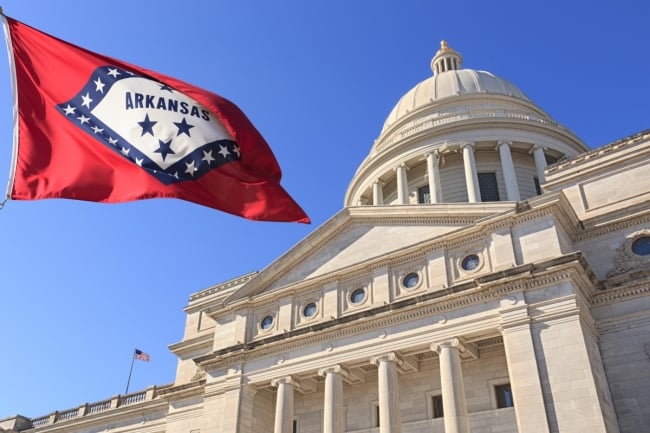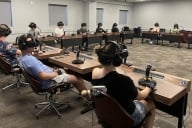You have /5 articles left.
Sign up for a free account or log in.

Istockphoto.com/DustyPixel
California and Massachusetts have recently announced plans to create freestanding online institutions within their public university systems. But they're not the first to make that leap -- Arkansas beat them to it by close to a half decade.
In 2011, faced with the reality that Arkansas is among the lowest-ranked states in terms of residents with bachelor's degrees, then governor Mike Beebe challenged the state's public university system to double the number of Arkansans with degrees by 2025. Some squabbling over funding and a rapid-fire accreditation push ensued.
EVersity launched in 2015 with $7 million in funds from the governor and the University of Arkansas system's internal reserves. It began admitting students the following January. By some measures, it’s been a difficult road: the institution’s annual costs thus far continue to outpace revenue, and the number of students enrolled remains below the goals laid out when the institution launched. But administrators remain confident in the university's mission and pleased with its trajectory.
This semester, 648 students are paying tuition for eVersity courses, according to Michael Moore, president of eVersity. Another 300 are in various stages of completing a free introductory class that serves as onboarding for students considering enrolling full-time. Close to 200 students have graduated from the institution thus far, all since 2016.
Public Universities Make Moves Online
Please see these related articles:
- How many universities can "go big" online?
- Arkansas' freestanding eVersity has grown slowly since 2015.
"Given the obstacles in creating a new university, the progress of eVersity is nothing short of remarkable and the institution is poised to expand rapidly in the coming year," Donald R. Bobbitt, president of the University of Arkansas system, said in a statement.
Reaching the adult market has been challenging, Moore admitted. Adult students are generally eager to learn, but many have experienced setbacks or life events that keep them from finishing their degrees in a timely manner. Helping these students complete takes time that enrollment numbers on the weak side often don’t reflect.
Adults with some college but no degree often have to be convinced that going back to college is worthwhile, given that they in many cases have made do in life without a degree. Moore prefers to call these students “stopouts” rather than “dropouts.”
“This is a really, really tough population,” Moore said.
On the other hand, he said, most of these students are highly capable: "You don’t get to 69 hours of college credit and not have the ability to do college work … The problem is life got in the way." On average, eVersity students end up with a grade point average 0.9 points higher than their GPA when they transferred, Moore said.
Developing an Identity
Unlike at many online institutions, all eVersity instructors are full-time faculty members in the University of Arkansas system. Moore said eVersity course designers strive to make explicit the "hidden curriculum" -- aspects of academic work that might not be familiar to adults who haven't been to college in decades, like the proper font size and margins to use when writing an essay. If that curriculum stays hidden, students might feel too embarrassed to admit they need help.
Despite challenges, enrollment has steadily increased at the institution each year since it launched, amid nationwide enrollment declines, according to Moore.
Since the beginning, eVersity has offered certificates and degrees in five key areas: business, information technology, health-care management, criminal justice and general studies. Once the institution passes its accreditor’s three-year holding period, administrators will consider expanding the pool of available academic disciplines, Moore said.
In the meantime, the institution has experimented with other ways to cater to the adult population. Adults who come to eVersity with more than 60 academic credits are automatically awarded an associate degree, even if those credits didn’t amount to an associate degree at their previous institution or institutions. Otherwise, for people in that situation, “when you check the box on a job application, the box you’re having to check is last degree earned -- high school,” Moore said.
The institution has also streamlined pricing to make its offerings accessible to as many students as possible. Each credit hour costs $175. EVersity’s admissions office pays to locate and evaluate transcripts for students who applied without sending theirs. Thanks to university-wide OER, eVersity students don’t pay extra fees for textbooks.
Before launching eVersity, system administrators considered growing online programs at existing campuses rather than creating a separate institution. Both approaches could have succeeded, according to Moore. But developing new capabilities might have been difficult at an institution with established technical infrastructure that's tied to a traditional semester schedule and financial aid disbursement model, Moore said.
"It allowed us to start with a clean slate, tabula rasa and innovate in a way that we knew was necessary for this particular audience," Moore said. Developing brand recognition for eVersity is an ongoing process, Moore said, but explicit ties to the University of Arkansas name help.
Graduation ceremonies with students who have been striving for decades for a college degree remind Moore of the value of his institution's efforts. One student enrolled at eVersity while serving food at a local conference center; by graduation, the same venue had hired her on its IT staff.
“These are highly capable students that simply need an opportunity, structured in the right way that is supportive for them, and they can do this work,” Moore said. “But you’ve got to rethink college in order to do that.”








